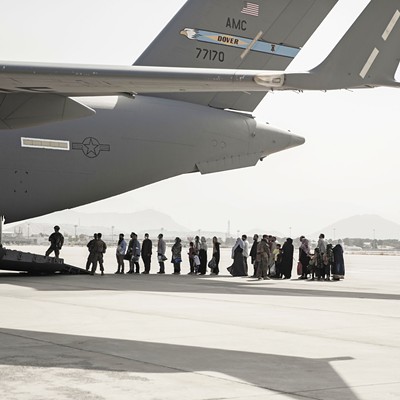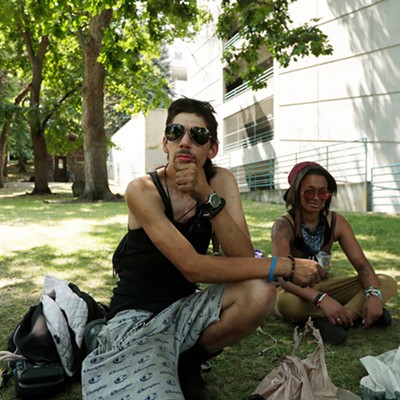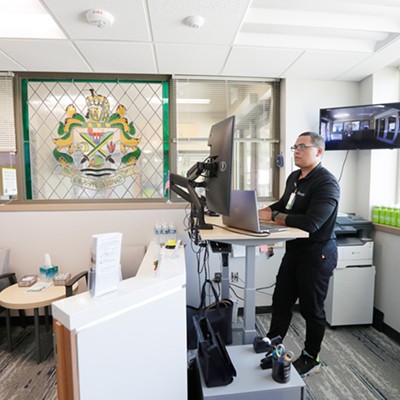Sudanese refugee Michael Bacuth's brother and sister-in-law were shot and killed in 2013, victims of the kind of violence that Bacuth came to Spokane to escape. But his niece survived, turning up in an Egyptian refugee camp five years later.
Ever since Bacuth has been focused on one mission: Rescue his niece.
"I need to bring her here because she's a little girl," Bacuth says. "Nobody is with her. That's why I need help. ... We're waiting for anybody to help us."
During the refugee-restricted years of the Trump administration, bringing his orphaned niece to America was nearly impossible. But Trump isn't president anymore. All it took was a few pen strokes for Trump to slam the door shut, and all it would take is a few pen strokes from President Joe Biden to fling the door back open.
"I think probably the most optimistic anticipation was that within the first week or two we'd see a dramatic reveal on the refugee program," says Mark Finney, director of World Relief Spokane, the region's local refugee settlement organization.
After Biden signaled forthcoming refugee-policy changes in a report to Congress in February, confidence was so high among some local refugees' family members, that flights were actually scheduled.
But weeks have passed, and Biden still hasn't signed.
"We've had families whose relatives have been booked to be reunited with them in March of this year," Finney says. "But because the Biden administration hasn't acted yet, those bookings were canceled. And they don't know when they're going to see their loved ones again."
Spokane's refugees have suffered through all the misery of the COVID lockdown and isolation along with everyone else. And while World Relief has tried to help those refugees navigate the pandemic, Finney knows that many of them have been waiting a lot longer than a year to be able to hug their family again.
"The fact that the Biden administration is choosing to punt on addressing refugee issues is really disheartening for people who are hoping that their family members can find safety," Finney says. "There's nothing we can really do locally to make up for the fact that the doors are just closed tightly right now."
SOMEONE WHO UNDERSTANDS
Across four years, Finney watched as Trump hollowed out America's refugee system.First, Trump temporarily froze the entire refugee program with his early travel ban, and then, year after year, he slashed the number allowed in the United States. In Obama's final term, the cap was set at 110,000; by last year, Trump had winnowed the number to just 15,000.
Not only that, but his administration changed the categories for which types of refugees were allowed in.
"A lot of refugees from places like certain parts of Africa don't qualify the way they used to," Finney says.
For refugee resettlement nonprofits like World Relief that rely on per-refugee federal grants to operate, Trump's policies starved them of funding. Donations increased, but it wasn't enough to compensate.
"The number of refugees went down by nearly 90 percent over just a few years," says Matthew Soerens, director of church mobilization for World Relief's national office. "We couldn't sustain the same footprint that we had in 2017."
Across the country, World Relief shuttered eight offices, including their Boise branch.
"It was really hard for the clients and the families they are working with," says Laura Armstrong, co-director of a Boise-based refugee-support organization. Armstrong says the local World Relief office worked hard to connect the refugees with the other local resettlement agencies before they shut down.
In Spokane, where World Relief is the only resettlement agency, the office stayed open, but with a smaller staff. And when the COVID pandemic hit a year ago, the role of these agencies became that much more crucial.
"Anxiety and depression are hard for all of us now during COVID, but even more for people whose family members are on the other side of the world in dangerous places," Finney says.
Saw Gary, a Myanmar refugee who came to the United States 17 years ago, says that the loss of in-person church services and other social activities was particularly hard for their community.
"We, as a refugee community, depend on each other," Gary says. "We always go to homes and visit each other. When COVID hit, we couldn't really do that."
Worse, as violence escalated after February's coup in Myanmar, the military government shut down the nation's internet, cutting off one of the few lines of communication with their families still in the country.
"I have a close friend that now cannot connect with their mom and dad," Gary says.
Meanwhile, Spokane's refugees, including some who speak only limited English, had to navigate the same complicated bureaucratic processes facing other Americans: filing for unemployment, seeking rental assistance, assisting their kids through online schooling, getting COVID testing and registering for vaccines.

That's where World Relief's new "community ambassadors" program comes in. Patricia Castaneda, a Venezuela immigrant, joined the agency in February 2020 to help with outreach for the Census. Once the pandemic hit, that mission broadened.
Castaneda says World Relief put together a team of "trusted messengers who are already leaders within several ethnic communities" to help local refugees and immigrants with tasks like finding rental assistance.
"They are these people who go to see what a letter says or to help make an appointment with doctors," she says. "We hire them to do the same thing, but more organized and more effective."
For something as important as convincing people to get vaccinated, Castaneda says, having someone who spoke the language, understood the culture and already had established trust was vital. If a family was having trouble paying for groceries, the community ambassadors would help them restock their pantry. If a refugee tested positive for COVID, the ambassadors would translate for them and get them the right resources.
"We were there for them. It was absolutely beautiful," Castaneda says. "They would call us, just to talk. 'Hey, I need somebody to talk to who understands our fears.'"
IN THE DARK
Funding World Relief's community ambassador program, however, took a patchwork of grants, local donations and federal COVID relief funding."We're pretty aggressively looking for funding to keep this going," Finney says.
But the future is particularly uncertain right now.
"Everybody I've been talking to in the refugee-settlement world really doesn't know what to expect now," Finney says.
He says it's unclear why the Biden administration has delayed reversing the Trump administration's immigration restrictions.
"It's hard to imagine what else would motivate them to hold off from refugees aside from the attention on different migration issues," Finney says.
With a sharp spike in the number of minors fleeing across the southern border in recent months, Biden has been assailed from both sides of the political aisle for how he's handled the crisis.
Still, on March 17, Biden Chief of Staff Ron Klain told the Congressional Progressive Caucus that Biden would raise the cap on the refugees "soon."
"Which is good," says Soerens, with World Relief's national office, "but 'soon' is kind of an ambiguous Washington word — not Washington state, Washington, D.C. — that can mean different things to different people."
Hopefully, Soerens says, Biden raises the refugee ceiling, and World Relief can go back into expansion mode, opening up new offices and hiring new staff. But that will take time.
"It's not a light switch that you turn off, and then two years later you turn it back on," he says.
For now, refugees like Bacuth and his niece are left in the dark, kept apart by the kind of lockdown that may remain long after COVID goes away. His niece is 13 now. He calls her in Egypt almost every day.
"She's asking me, 'What are we going to do now? When are you guys to bring me there?'" Bacuth says. "I say, 'No way now. Everything's closed. Nothing's open.'" ♦



























